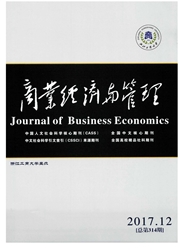

 中文摘要:
中文摘要:
近年来,我国百货业经营模式从传统的自营模式逐渐转为联营模式,百货店对商品的进、销、存管理功能弱化,百货业的盈利模式随之也发生根本性的变化,出现靠收取专柜佣金或租金盈利的"通道费盈利模式"。这种盈利模式使我国百货业发展出现诸多弊端,并造成我国百货业态属性的变异,不利于我国百货业的持续发展。文章主要运用百货业上市公司数据,分析联营模式下我国百货业业务结构、利润来源、盈利能力和盈利潜力的变化,探讨了这种盈利模式对百货业核心技术、服务特征、盈利空间和风险形态的影响,并指出我国百货业盈利模式向"价值链盈利模式"转变所需要的条件和路径,据此提出相应转变的对策思路。
 英文摘要:
英文摘要:
In recent years,business models of department stores in China have changed from proprietary trading to joint ventures,and this change reduces department stores' functions of purchase,sales,inventory management.As a result,department stores' profit models change fundamentally,and a "slotting-allowance-based model" arises.This profit model brings about many problems,causes the variation in department stores' operation models,and harms the sustainable development of China's department stores.By analyzing the changes in business structure,sources of profits,profitability and potential earnings,this article inquires into the influence of this profit model on the changes in department store's core technology,services,features,profit spaces and patterns of earnings,and points out the conditions and paths to transform the current profit models into the "value-chain-based profit models".Finally,some countermeasures about the transformation are put forward.
 同期刊论文项目
同期刊论文项目
 同项目期刊论文
同项目期刊论文
 期刊信息
期刊信息
